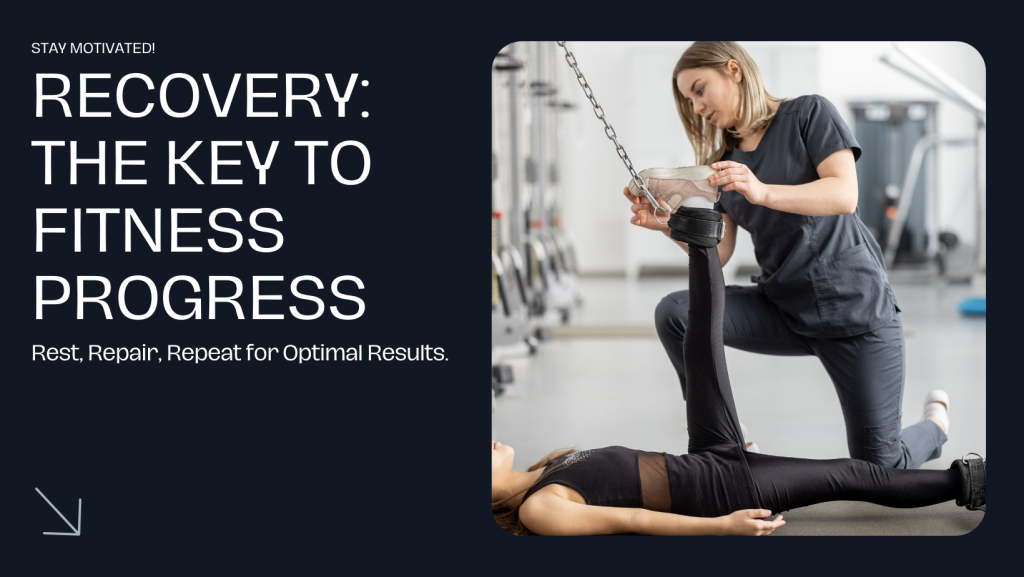Introduction
You did amazing at the gym today—you conquered another workout. Before diving, into the intense session, there’s a crucial factor that can significantly impact your fitness journey; recovery.
While pushing yourself during workouts is crucial, giving your body time to recover between sessions is just as important. Recovery is when the true transformation takes place—it’s the time when your muscles heal, strengthen, and become more resilient. Neglecting recovery by not resting or refueling correctly can hinder progress and increase the risk of overtraining or injury.
This detailed guide delves into the significance of recovery. Offers proven methods to optimize your body’s rejuvenation, for fitness performance.
The Science Behind Why Recovery Matters
It’s crucial to prioritize recovery after a workout that causes tears in your muscles and inflammation. Failing to give your body time to heal from this exercise-induced damage can turn those tears into larger ones. Inflammation lingers, draining your body’s resources and resulting in fatigue, soreness, increased risk of injury, and performance plateaus.
During recovery periods lasting 24–48+ hours, your body kicks into gear processes such as;
Building muscle protein to strengthen muscle fibers
Replenishing glycogen stores and essential nutrients
Reducing inflammation caused by exercise
Restoring the central nervous system
Replenishing electrolytes and rehydrating the body
Eliminating exercise byproducts like lactic acid
Neglecting recovery can cause your hard work to backfire, leaving you feeling weaker, stiffer, more fatigued, and prone to injuries—the opposite of what you aim for! Let’s enhance our recovery methods to maintain a state of building muscle and gaining strength.
Sleep: A Key Element in Recovery
Getting adequate sleep significantly boosts recovery by stimulating hormones that aid, in muscle rebuilding, energy replenishment, inflammation reduction, and more. Insufficient sleep can notably impair performance. Strive for getting 7–9 hours of sleep each night by;
Maintaining a dark and quiet bedroom Sticking to a consistent bedtime routine, going to bed earlier Avoiding caffeine in the evenings Minimizing screen time, before bed to reduce exposure to blue light Try relaxation methods such, as gentle yoga if you’re having trouble sleeping Besides sleep, make sure to plan occasional “rest days” by easing up on intense workouts every few days to give your body time to recover.
Fueling Up with Recovery Nutrition
Your food and beverage choices play a role, in how your body recovers after intense training sessions. Here are the key nutritional aspects to consider;
Protein. Supplying amino acids for repairing and building muscle tissue. Aim to consume 20 to 30g of protein, such as whey, within 30 minutes post-workout.
Carbohydrates. Replenishing depleted glycogen stores to restore energy levels. Opt for carbohydrates found in grains, fruits, and vegetables.
Hydration. Staying properly hydrated is crucial for recovery. Drink fluids that contain electrolytes lost through sweat.
Antioxidants. Vitamins C and E, present in fruits and vegetables, help combat stress caused by exercise.
Time your nutrient intake strategically by incorporating workout shakes or meals that include protein, carbohydrates, antioxidants, and fluids.
Emphasize Active Recovery
Related article: 15 Alkaline Foods for a Harmonious Body pH: Boost Your Health Today
While adequate rest is important, sedentary periods between workouts can impede recovery progress. Engage in impact ” recovery” activities like;
Gentle cardio exercises (walking, cycling) Stretching routines and yoga sessions Foam rolling exercises Light swimming or pool-based movements…to enhance blood circulation and eliminate metabolic waste like lactic acid buildup. Additional techniques, such, as using compression garments or receiving massages, can further improve circulation.
The Role of Supplements
Powder aids in muscle protein synthesis for repairing and rebuilding fibers.
BCAAs (Branched-chain amino acids) help prevent muscle breakdown.
Creatine supports ATP energy replenishment during workouts.
Fish oil reduces inflammation caused by exercise.
Tart cherry juice contains antioxidants that combat oxidative stress.
It’s important to verify the quality of sources and proper dosing. Prioritize food before considering supplements as an addition.
When is it best to take a recovery week?
For fitness objectives, schedule a recovery week every 4 8 weeks by reducing;
Workout volume by 50–70%
Workout intensity by 50%
Allow extra time for recovery between sessions. Recovery weeks are essential to prevent overtraining allowing your body to absorb the training stimulus from weeks renewing energy levels and resetting your mindset.
Listening to your body is key;
Recovery needs are individualized based on factors such as age, genetics, training intensity, and life stress. While guidelines can be informative, it’s vital to pay attention to how YOU feel. Monitor;
Motivation, energy levels, and mood
Quality of sleep
Changes in appetite
soreness or lingering injuries
If you experience fatigue, stress levels, or difficulty alleviating soreness, these are indicators that you may require more time, for recovery.
Frequently Asked Questions About Enhancing Recovery
How soon will I notice improvements by enhancing my recovery routines? Most individuals experience an increase, in energy, performance, and reduced muscle soreness within 2 to 3 weeks of focusing on sleep, nutrition, scheduled rest, and active recovery.
I have work hours. What can I do to optimize my recovery? Prepare meals with foods that aid in recovery ahead of time. Take breaks during the day for movement, like walks. Maintain a sleep schedule whenever possible.
Are tubs or ice baths beneficial for recovery? Hot tubs can promote blood flow for recovery, but avoid using them right before bedtime as they can disrupt sleep. Ice baths can temporarily reduce inflammation. Prolonged exposure may impede muscle growth.
I’m feeling excessively fatigued from training. What steps should I take? Dedicate a week to activity and prioritize rest, hydration, and nutrition to recharge your body. Consider seeking guidance from a coach for a deload plan.
Optimizing your recovery strategies rather than working harder is the key, to enhancing adaptation, preventing burnout, and elevating your fitness goals to new heights! Prioritize your recovery without compromise.








